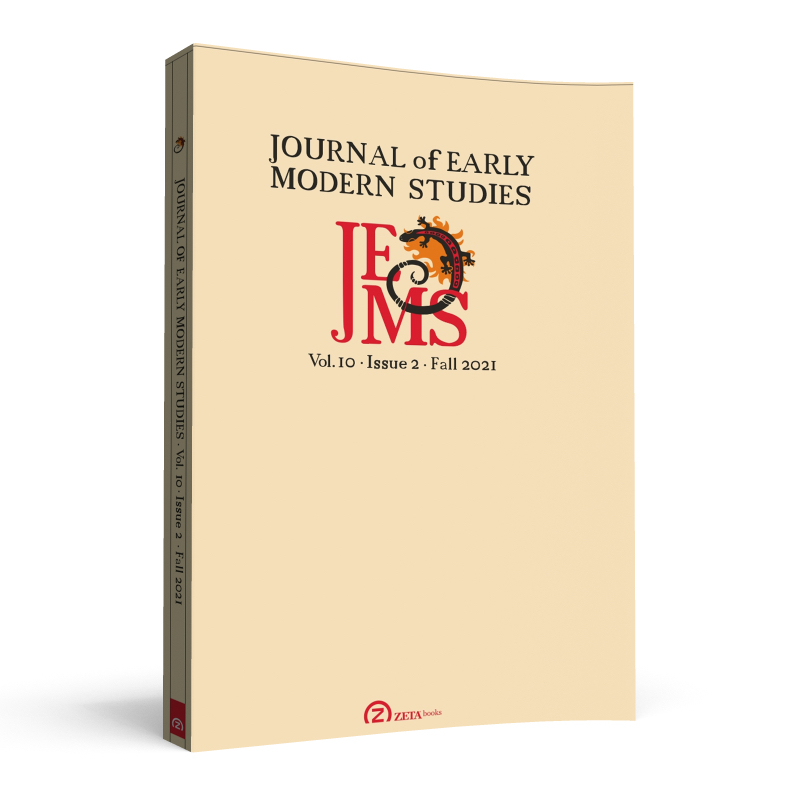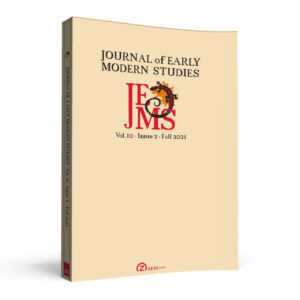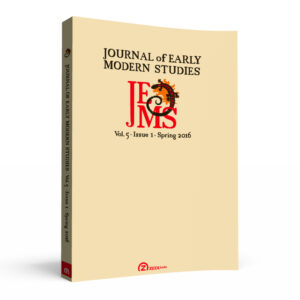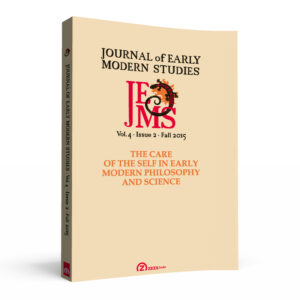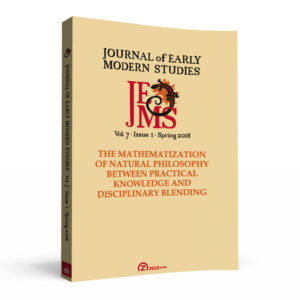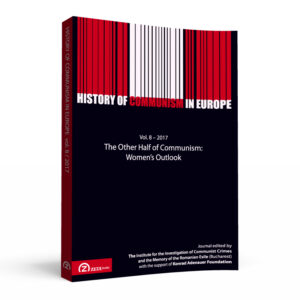Journal of Early Modern Studies, Volume 10, issue 2 (Fall 2021)
ISSN: 2285-6382 (paperback) / ISSN: 2286-0290 (electronic)
CONTENTS
ARTICLES:
Kyle S. Hodge: The Conservatism of the Counterreformation in Montaigne’s Apology for Raymond Sebond
https://doi.org/10.5840/jems202110213
Abstract: Montaigne’s “Apology” is a lengthy work the overarching theme of which is the relationship between epistemology, virtue, and vice. It is a commentary on the thesis that science or knowledge “is the mother of all virtue and that all vice is produced by ignorance.” Montaigne’s response is radical and unequivocal: there is no idea more harmful; its consequences are no less than the destruction of inward contentment and the undermining of societal peace and stability. Indeed, Montaigne sees the Protestant Reformation as the instantiation of this terrible thesis, with all of the attendant trouble it had and continued to cause in France. So Montaigne inverts the thesis: ignorance begets virtue and (presumption of) knowledge vice. Out of this inversion he draws many conservative social and political consequences, and this is one of the most interesting and yet underexplored aspects of the text. Montaigne exhibits the conservatism of the Counterreformation in the “Apology,” and I intend to draw more attention to this theme. I show that Montaigne’s main target in the “Apology” was not dogmatism as such, but Protestantism as a species of dogmatism. I then show that, by using a few elementary epistemic concepts, Montaigne launches a withering skeptical attack on the Reformation. Out of this criticism I draw some important conservative themes that have important implications for our understanding of Montaigne’s social and political thought, as well as for conservative political theory and its intellectual history.
Keywords: Montaigne, conservatism, political theory, intellectual history, skepticism, Pyrrhonism, Reformation, Protestantism
Olivier Dubouclez: Descartes et les quarante passions. Ordre et dénombrement dans les articles 53 à 67 des Passions de l’âme
https://doi.org/10.5840/jems202110213
Abstract: The enumeration of the “principal passions” in the articles 53 to 67 of the Passions of the soul (1649) is generally regarded as laborious and unclear. This article opposes to this view and proposes elements to make sense of Descartes’ enumerative procedure. First, it clarifies the nature and function of what is called “ordered enumeration”: it amounts to a methodical act of collecting which has not be confused with a cognitive sequence based on determinate principles. The article also suggests that the paragraph 52 of the Passions provides relevant indications in order to account for the structure of Descartes’ discourse. Indeed, different ordering criteria can be deduced from the understanding of what the emotional object is (namely profit and importance), but also of Descartes’ emotional subject as a “mind-body union” put into motion by passion (temporality). The article finally insists on Descartes’ main novelty: his forty “principal passions” are not exclusively centered on the ego and his desire; on the contrary, the enumeration makes room to other human beings who, being emotional subjects in their own right, play an active role in the development of the subject’s sentimental experience.
Keywords: Mind-Body Problem; Descartes; Desire; Enumeration; Intentionality; Intersubjectivity; Method; Order; Passions; Psychology; Thomas Aquinas; Time.
Fabrice Schultz: Alchemy and the Transformation of Matter in Richard Crashaw’s Poetry (1612-1649)
https://doi.org/10.5840/jems202110214
Abstract: This paper studies the English poems of Richard Crashaw (1612-1649) from a historicist and formalist perspective. It specifically considers Crashaw’s poetry in its religious but also intellectual and early scientific context to investigate the frequently overlooked influence of science on his poetry. Metaphors drawn from alchemy and particularly from the transformation of matter to achieve its purification and spiritualisation enrich the poet’s expression of mystical devotion to underline that access to the spiritual as well as mystical union with Christ are deeply rooted in the devotee’s body. Representations of the earth as a chemical laboratory focus on materiality and corporality to emphasise the constant movement animating matter. A form of spiritual alchemy underscores Crashaw’s Christocentrism and references to the metamorphoses of matter consistently aim to express mystical union. A meta-poetic analysis eventually highlights a significant analogy between reading and alchemical processes in order to demonstrate the anagogical aim of Crashaw’s verse and the way his poems work on his reader’s heart to lift his soul. References to liquefaction, distillation or sublimation echo the published works of mystics but alchemical conceits based on symbolically evocative topoï and polysemic vocabulary reinforce the importance of the corporal in the experience of mystical union.
Keywords: alchemy, mysticism, Christocentrism, Richard Crashaw, scientific metaphors, devotional poetry
Hasse Hämäläinen: Swedenborg’s Religious Rationalism
https://doi.org/10.5840/jems202110215
Abstract: This article argues that contrary to a received interpretation, Emanuel Swedenborg’s doctrine of correspondences (scientia correspondentiarum), according to which each empirical reality has a corresponding spiritual reality, is closer to Spinozistic monism than Neoplatonic idealism. According to the former, there is only one substance: God, which we can cognize through its spiritual and material aspects. According to the latter, the material world consists of substances that receive their form through participation in the ideas of the spiritual world. The article will show that although some of Swedenborg’s claims can appear as expressing Neoplatonic idealism, his reading of the Bible as a guide for moral improvement, his rejection of the religious mysteries that cannot be rationally understood, his various examples of correspondences, his view that we can cognize God by studying the correspondences, and his definition of God as the only substance, make evident that he does not consider the spiritual realities as ideas in the Neoplatonic sense. The article will interpret Swedenborg to think that the spiritual realities are learned concepts that enable us to describe and experience the world as having spiritual significance and thus acquire a fuller cognition of God.
Keywords: Neoplatonism, rationalism, religion, Spinozism, Swedenborg
Eduard Ghita: Adam Smith on Beauty, Utility, and the Problem of Disinterested Pleasure
https://doi.org/10.5840/jems202110216
Abstract: The large extent to which aesthetic terms pervade Adam Smith’s discussion of ethics would seem to suggest, in the least, that the spheres of aesthetics and ethics are interwoven in a way hardly possible to conceive in the wake of Kant. Despite this recognized closeness between the two areas, one account in the literature has claimed that Smith’s understanding of beauty anticipates Kant’s modern notion of disinterested pleasure. It is claimed that according to Smith, disinterested pleasure is aroused by the harmony of our moral sentiments as well as by the beauty of “productions of art.” By analyzing the relation of beauty to utility in Smith’s aesthetics and ethics, I will be arguing against the attribution to Smith of a specifically disinterested pleasure in our judgments of the beauty of the productions of art, as well as in the beauty of moral objects, such as virtuous character and conduct.
Keywords: beauty, utility, pleasure, disinterestedness, aesthetics, ethics
Review Article:
Benjamin Goldberg: Religion, Medicine, Politics, and Practice [Michelle DiMeo, Lady Ranelagh: The Incomparable Life of Robert Boyle’s Sister, Chicago: University of Chicago Press, 2021]
https://doi.org/10.5840/jems202110217
Review:
Anton M. Matytsin: Brian C. Ribeiro, Sextus, Montaigne, Hume: Pyrrhonizers, Brill Studies in Skepticism, Volume 4, Leiden and Boston: Brill, 2021, ix + 165 pp.
https://doi.org/10.5840/jems202110218

